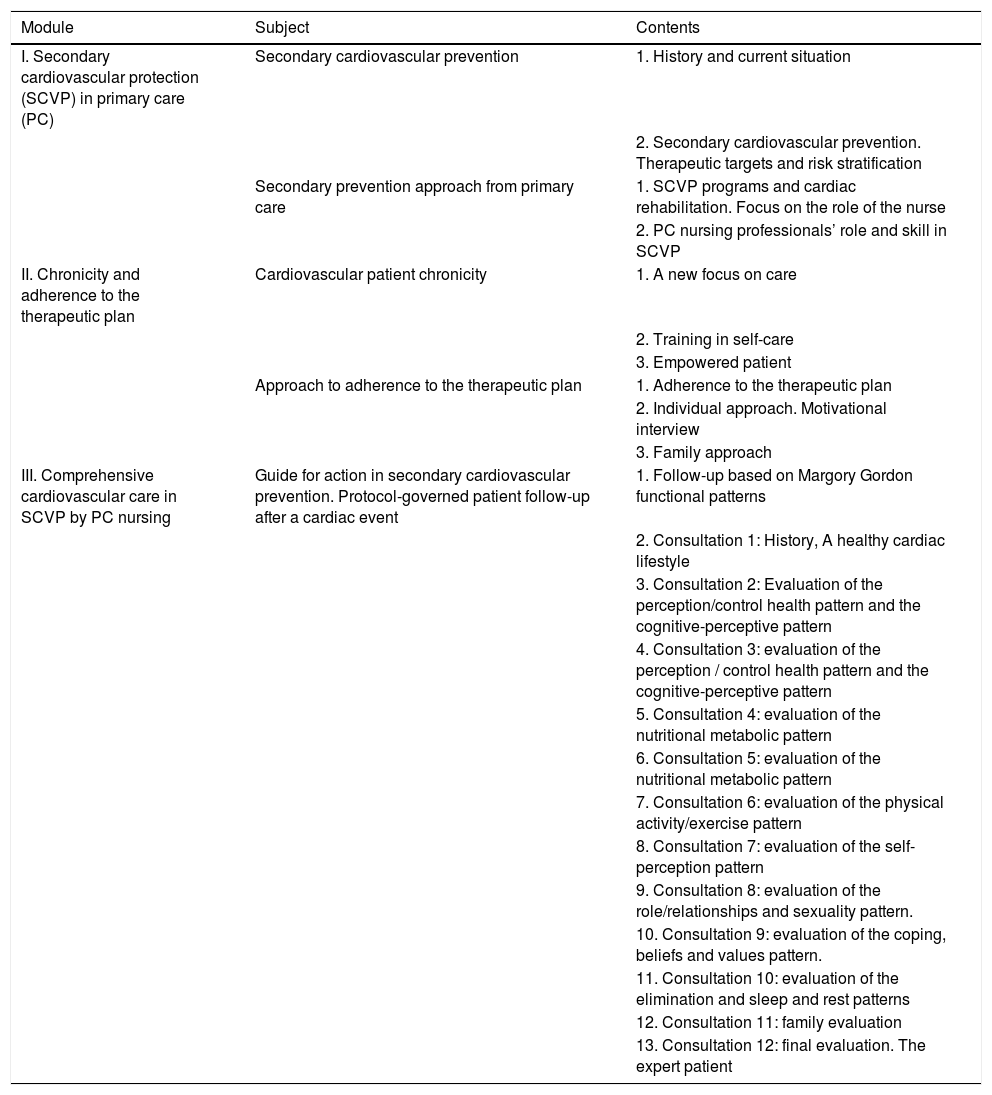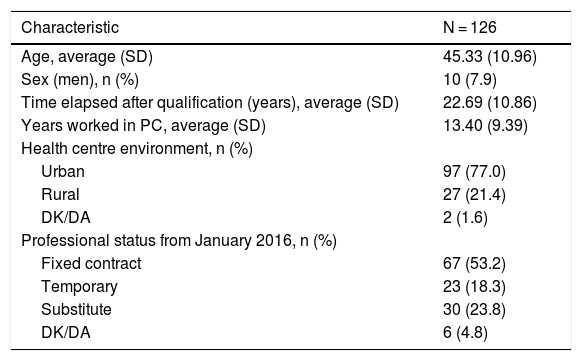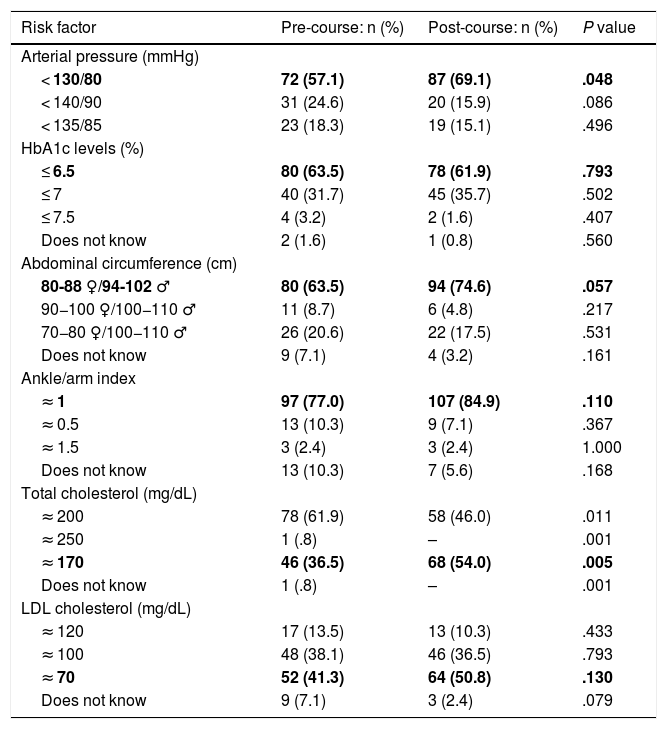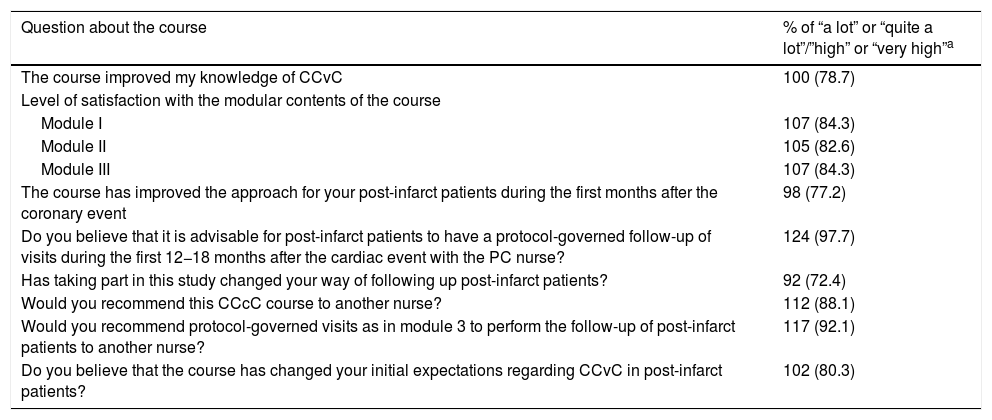to assess the effect of the “Program of Training in Integral Care for Secondary Cardiovascular Prevention in Primary Care Nursing” on the level of knowledge, the degree of application of comprehensive cardiovascular care, and on the continuity of care between the cardiac rehabilitation and primary care units, in relation to post-infarction patients.
MethodsQuasi-experimental before-after study without control group. Comprised an ad-hoc survey prior to training via the Internet and a post-training survey; both the pre- and post-course surveys were anonymous. The program consisted of secondary cardiovascular prevention training, chronicity in the cardiovascular patient and adherence to the therapeutic plan, and follow-up protocol.
ResultsOver one third of the respondents did not know the control objectives of the different cardiovascular risk factors, more marked regarding lipid control. The program significantly improved the knowledge of the objectives of blood pressure, total cholesterol and LDL cholesterol, and the self-perception of better monitoring of lipid parameters and waist circumference. In centers with a cardiac rehabilitation unit, 73% of respondents indicated that there was "no" communication with the unit before the course, reducing to 55% in the post-course survey.
ConclusionThere are clear training needs of nurses for their involvement in these secondary prevention programs. A specific continuous training in secondary cardiovascular prevention for nurses in the field of primary care, improves and facilitates the acquisition of knowledge at this level, can improve the approach of patients with cardiovascular events during the first months of said event and communication with the reference cardiac rehabilitation units.
Evaluar el efecto del “Programa de Capacitación en Cuidados Integrales para la Prevención Secundaria Cardiovascular en Enfermería de Atención Primaria” sobre el nivel de conocimientos, el grado de aplicación de los cuidados cardiovasculares integrales y sobre la continuidad asistencial y de cuidados entre las unidades de rehabilitación cardiaca y atención primaria, en relación a los pacientes postinfartados.
MétodosEstudio cuasi-experimental antes-después no comparativo. Comprendía una encuesta ad-hoc previa a una formación vía internet y una encuesta posterior a la formación; tanto la encuesta previa como la posterior al curso eran anónimas. El programa consistía en formación en prevención secundaria cardiovascular, cronicidad en el paciente cardiovascular y adherencia al plan terapéutico, y protocolización del seguimiento.
ResultadosMás de una tercera parte no conocía los objetivos de control de los distintos factores de riesgo cardiovascular, de forma más marcada para el control lipídico. El programa mejoró de forma significativa el conocimiento de los objetivos de presión arterial, colesterol total y colesterol LDL, y la autopercepción de un mejor seguimiento de los parámetros lipídicos y el perímetro abdominal. En los casos que contaban con una unidad de rehabilitación cardíaca, antes del curso un 73% de los encuestados indicaron que no había “ninguna” comunicación con ella, reduciéndose al 55% en la encuesta posterior al curso.
ConclusiónExisten claras necesidades de formación de las enfermeras para su implicación en estos programas de prevención secundaria. Una formación continua específica en prevención secundaria cardiovascular para enfermeras del ámbito de la atención primaria, podría mejorar la adquisición de conocimientos a este nivel así como el abordaje de los pacientes con evento cardiovascular durante los primeros meses de dicho evento y la comunicación con las unidades de rehabilitación cardiaca de referencia.













